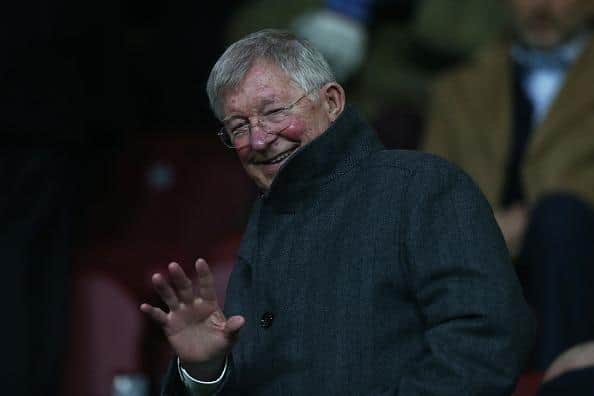Former Brighton boss reveals the secrets of Sir Alex Ferguson's pre-season playbook
and live on Freeview channel 276
Having signed for Aberdeen just before the 78/79 season transfer deadline, McGhee’s first experience of ‘pre-season’ with Fergie was in the summer of 1979.
“The thing that sticks in my mind even all these years later, was the amount of gratuitous running from the outset. Straight away it was 2 sessions a day and Fergie would have us all running up into the woods and along the River Don, with his coaching staff dotted around the course, making sure no one cut any corners and obviously logging all of our times.”
Advertisement
Hide AdAdvertisement
Hide Ad“Within a week, he then introduced various passing drills and incorporate ball work with the running, but throughout he made it ultra-competitive, clearly all part of his master plan as the Dons went on to not only break the Old Firm monopoly in the Scottish League but conquer the likes of Real Madrid in Europe.”


After a period of success at Pittodrie McGhee moved to the Bundesliga in 1983 to play for the then reigning European Champions Hamburg, under the legendary chain smoking, cognac drinking Austrian Ernst Happel.
“I quickly worked out why the Germans had been so successful in being at the sharp end of every major tournament for over a decade, it was all down to not only the training but also the mentality.”
“There was an incident involving some extremely attractive Frauleins outside our dressing room at a pre-season friendly, at Celtic, with the likes of Maurice Johnston or Frank MacAvennie, you’d have been crushed in the rush, but the Hamburg players ignored the girls, no emotion, they just got on with the task in hand, totally focused.”
Advertisement
Hide AdAdvertisement
Hide Ad“After a couple of early friendlies against local team Hamburg went to the Black Forest, where Scotland had been based in the 1974 World Cup, for 17 days, unheard of even now for any British team”.
“In that time, we’d play 7 games, and on the days, we didn’t have a game we’d train three times.7am start, running 40 mins up into the Forest, then back down, shower and breakfast, then a session at 11am doing football drills, lunch then rest before the third and final session at 6pm for an hour which predominantly was 4 v 2 scenarios in marked-out areas, or a full on practice game, Happel loved them!.”
“Happel favoured the 4 v 2 format as part of his player development, even well into the season he’d do a lot of it the day after a game, and on a number of occasions Hamburg Director of Football Gunther Netzer would bring his boots down to the training ground, and sometimes his mate Franz Beckenbauer!”
“Me and my Norwegian teammate, Eric Soler, often found ourselves playing the 4 v2 format against the quartet of Netzer, Beckenbauer, Felix Magath and Manny Kaltz!”
Advertisement
Hide AdAdvertisement
Hide Ad“But Happel was also the ultimate man manager because at 9pm on most nights of the 17-day training camp, he’d get the whole squad together for one beer before bed”.
“I actually think the recreation or at least the attempt, of this kind of training cost Magath his job at Fulham years later, it clearly worked for Happel at Hamburg but not in West London in the modern era”.
With these two influences and benchmarks in his career McGhee took what he’d learnt into his own management career, beginning at Reading, before spells at Leicester, Wolves and Millwall.
Having arrived at Withdean in the November of the previous season, McGhee’s first experience of pre-season with the Albion was in the wake of Play-off win at Cardiff in 2004.
Advertisement
Hide AdAdvertisement
Hide Ad“Obviously the whole club was on a high being back in the Championship, which in turn allowed me to step it up a bit on the training pitch. We may have had the lowest budget in the League and being financially strangled off the field over the Falmer planning but everyone was really up for it from Day One.”
“All credit to the likes of Guy Butters and Charlie Oatway, who were not only training twice a day with the rest of the squad, both of them were in at 7.30 in mornings doing an hour on the running machine, Guy who as we all know is a big lad, was also doing a fourth session on the treadmill after training had finished, but later said I effectively helped extend his career by 4 years.”
But nearly 50 years on from when his pro career started in Scotland with Greenock Morton what does McGhee see as the biggest changes to the culture of pre-season?
“Obviously one of the biggest factors is players get to train on perfect surfaces from the first day, back in the 1970’s and 80’s we never got sight of a decent training surface until September time.”
Advertisement
Hide AdAdvertisement
Hide Ad“It’s also more scientific, there’s more profiling and analysis, that’s not to say Fergie wasn’t a great exponent of this back in the day, it was just looked at from a different angle.”
“Archie Knox, who worked with Fergie at Aberdeen, kept all the timings of the runs going right back, when he was with me at Millwall in 2002, he compared the stats from 20 years or so before and the Aberdeen group was still faster despite Millwall arguably being perceived to be fitter for the modern game.”
“However, the prime factor is still the same today as it was back then, pre-season is not only just about fitness, it's about bonding and forming the core of the side. Whilst sometimes other factors can come into play, a team that doesn’t get its preseason right will invariably find themselves at the wrong end of the League”.